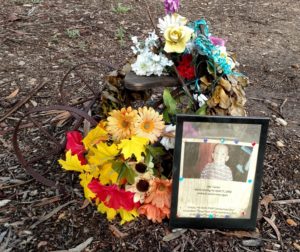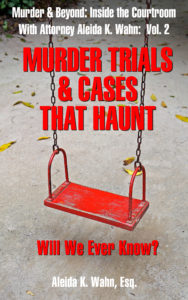
A cold case for 14 years. A memorial with a picture of Jahi Turner is left beside a child’s tricycle at the Golden Hill park where Tieray Jones said Jahi disappeared on April 25, 2002. On April 19, 2016, Tieray Jones was charged with Jahi’s murder.
Where is Jahi Turner?
It has been 16 long years since little two-year-old Jahi Turner seemingly disappeared into thin air. Did he as the prosecution contends, die at the hands of his stepfather Tieray Jones, only to then be thrown away in the trash like garbage, never to be found? Or was Jahi accidentally injured and Tieray Jones failed to seek medical care, either through a conscious disregard or through negligence? Or could it be that Jahi was kidnapped from a park in broad daylight? These haunting questions were front and center in the murder trial of Tieray Jones, a cold case which took 14 years to charge.
On April 25, 2002, at 2:27 in the afternoon, Tieray Jones called 911, and in a breathless and panicked voice reported his stepson had vanished from a San Diego park when he walked to a vending machine to purchase a drink for the toddler. Telling the 911 operator he had only walked a short distance, the actual length was later measured at 474 feet. Was Jones living a parent’s worst nightmare or had he concocted an elaborate lie to hide a horrible truth? But what that truth may be and what exactly happened to Jahi in the short days he lived in San Diego remains an unexplained mystery that has blanketed this case for nearly two decades. The most searing questions of all remain though: Where is Jahi Turner and will he ever be found? Despite a massive search effort and years of investigation, Jahi’s body has never been located. Nevertheless, the prosecution charged Tieray Jones with murder.
Background of Jahi
Jahi Turner was born to 16-year-old Tameka Jones on February 10, 2000, in Frederick, Maryland. Tameka’s mother took care of Jahi to enable Tameka to complete her high school education. Following graduation, Tameka joined the Navy, and married Tieray Jones, a person she had known since she was 13 years old. Tameka was 18 and Tieray was 22 at their December nuptials. In February of 2002, the couple moved to San Diego to commence Tameka’s naval duties, with the plan Jahi would join them by summer.
Two months after arriving in San Diego, Tameka received an urgent telephone call that child protective services had been called and she must immediately take Jahi or he “would go into the system.” Tameka’s mother was a “functioning addict,” but now her drug use would cost Jahi his home. As Tameka did not have any money to make the trip, she received assistance from a family center and Navy friends generously took up a collection to raise the necessary funds.
On Sunday night, April 21, 2002, Tameka arrived back in San Diego with Jahi. He was a happy, healthy little boy, with a future seemingly bright. Early the next morning, Tameka departed on a five-day deployment not knowing she would never see her son again.
Tieray Reveals Jahi “had a little accident”
On Tuesday morning, April 23, 2002, Tameka called Tieray from her Navy ship and he told her Jahi had “had a little accident.” He said Jahi was sitting on the bed when one of their cats jumped up, and Jahi fell and hit his head on the dresser. He said Jahi had a bump on his head but was fine. He further confided that Jahi had wet the bed the night before, in a bed he was sharing with Tieray as Jahi did not yet have a bed of his own. Tieray’s version of the fall would vary over time.
Murder He Wrote? What Did Tieray’s Journal Entries Really Mean?
Tieray and Tameka kept a journal in which they wrote to each other as a way to stay connected during their separations. The journal was found by police on top of the couple’s bedroom dresser on the day Jahi was reported missing. Although on Tuesday morning Tieray told Tameka Jahi was fine after bumping his head, his journal entry of that night revealed a different story. On Tuesday, April 23, 2002, at 7:00 p.m., Tieray wrote: “Today for some reason he hasn’t been moving or really talking. Jahi is starting to act really funny he won’t get up off the floor. He’s not walking or talking when I tell him to get his cup he just looks at me. I know it’s going to take some time. But I don’t want him hating me for something I can’t control.” Was this entry the smoking gun, showing Jahi was severely injured and moving towards death? Did Tieray know Jahi was injured, and failed to seek medical care because he had inflicted the injury? Or was there a more innocent explanation for these symptoms, such that medical care was unnecessary?
Dr. Jennifer Davis, a pediatrician and child abuse expert was called by the prosecution as their medical expert. She questioned why Tieray told differing stories about the fall if it really was just an accident and stated a simple roll off the bed onto the carpeted floor would not have resulted in the types of symptoms reported. She testified that an abusive head trauma was the most common injury for a child under three, and the number one sign of abusive head trauma was lethargy, such as described in the journal. Dr. Davis pointed to stressors she found in the case which can lead to child abuse, specifically citing Jahi’s potty training accidents and bed wetting, financial stress over the lack of money, lack of food, and Tieray’s inability to purchase cigarettes.
The prosecution showed Tieray was obsessed with trying to obtain money, making 44 calls on Wednesday alone seeking funds, and his frustration was running high. Tieray and Tameka had exhausted all their money for the move to San Diego and were awaiting reimbursement from the Navy. Tameka used their last $20 to take a cab to her ship, leaving Tieray without any cash for the five days she would be gone. Tieray was upset as he would not have money to even purchase cigarettes. The reimbursement funds were at last deposited, but the bank would not allow Tieray to use Tameka’s bank card without her authorization. Resorting to extreme measures, he called the bank and pretended to be a woman, and even persuaded an ex-girlfriend to call the bank and say she was Tameka. Despite all his efforts, he still could not obtain any funds, either from the bank or from friends. To make matters worse, while on the telephone to the bank, the telephone was cut off for lack of payment. In the journal of Wednesday night, Tieray wrote, “This couldn’t be a more fucked up day.” Tieray’s quest to obtain money would continue, still trying all the way up to six minutes before he placed the 911 call.
Concluding her testimony, Dr. Davis rendered her opinion Jahi had suffered a severe injury, possibly inflicted, and had likely died as a result of failure to seek medical care. She did acknowledge on cross-examination that without a body there was no way to tell whether the injury was intentional or accidental, and confirmed she had never testified in a no body case.
The defense countered with their own pediatrician and child abuse expert, Dr. Frederic Bruhn. He testified he could not render a medical opinion or come to any conclusion about what had happened without more information and objective evidence, such as an in-person examination, a body, autopsy report, photographs, or x-rays. By just what was written in the journal, there was not enough to ascertain whether Jahi needed medical attention he further concluded. He then pointed to the journal entry of the next morning which indicated Jahi was better, causing Dr. Bruhn to opine it wasn’t a serious injury. He cited other reasons which could have caused the reported symptoms, including homesickness, fatigue, disrupted sleep pattern, or intercurrent illness. Dr. Bruhn ultimately did not believe there was enough proof to make any definitive conclusion.
In a move that surprised many, Tieray Jones took the witness stand in his own defense. Deputy Public Defender Courtney Cutter gently walked him through the journal entries. He had written the bump on Jahi’s head had gone down, he had put ice on it, and he did not think that was what was wrong with Jahi. When asked by attorney Cutter if he thought the bump on Jahi’s head had anything to do with the symptoms, he answered, “No.” It was nothing that would make him think he needed to go to the hospital either. Tieray testified he thought Jahi “had just had it, had hit that homesick wall.” He further wrote how he thought “Jahi was just coming around.” Tieray explained the journal entry, “I don’t want him hating me for something I can’t control,” was not about losing his temper, but about not wanting Jahi to hate him because Jahi had to be removed from his grandmother’s home so suddenly.
Attorney Cutter also highlighted the entries where Tieray professed his love for Jahi, wrote he wanted to give Jahi his last name, and discussed plans for the life they would build as a family. On March 28, 2002, Tieray wrote to Tameka, “The same way you feel about Jahi I do too.”
Without a doubt, the journal was a crucial piece of evidence in the case, and a key reason Tieray Jones was charged with murder. To the defense the journal represented even more. Attorney Cutter told the jury in her closing argument that the prosecution wanted them to believe the journal was the dead body in the case. To powerfully illustrate her point, she lifted the journal high in the air and proclaimed, “This is your dead body. Are you comfortable with that?”
Neighbors Saw Tieray Carrying Out Bags of Trash Before Jahi Was Reported Missing
On Wednesday morning, April 24, 2002, the morning after Tieray detailed Jahi’s symptoms in the journal, Tieray’s neighbor saw Tieray coming down the stairs with two large black trash bags that were really rounded and did not look like trash. They made eye contact and Tieray glanced away really quickly. He headed to a further trash bin than the one closest to their apartment. He soon carried out another black trash bag that was less full and looked like normal trash. Another neighbor saw Tieray carrying out a white trash bag. Neither neighbor ever saw him with a child.
Tieray Makes 5 Emergency Phone Calls to Tameka – Was Jahi Dead?
Prior to Tieray’s 911 call at 2:27 p.m., Tieray attempted to reach Tameka on her Navy ship in a succession of five emergency telephone calls. On Thursday, April 25, 2002, he made morning calls at 11:39, 11:40, 11:45, 11:57, and 12:03 frantically trying to reach Tameka. He left voicemail messages stating, “It is an emergency.” When pressed in one police interview as to what was so urgent, Tieray terminated the interview.
To continue reading about what happened in this heartbreaking trial, please go to Aleida K. Wahn’s book, Murder Trials & Cases That Haunt: Will We Ever Know? Aleida was there inside the courtroom for every minute, and now shares the extraordinary details of what really happened in these gripping and unforgettable trials. Order your copy today at: https://www.amazon.com/dp/B0B31PDDG3

About Aleida K. Wahn, Esq.


I am an attorney, award-winning true crime writer, and legal analyst of criminal cases. I cover criminal trials and write stories and books about compelling, gripping, and unforgettable cases that impact our world. I take you into the courtroom in high-profile murder trials, rape cases, crimes of passion, cases involving mental illness, deviant behavior, and more. I have a deep passion for true crime, criminal law, and all aspects of the criminal justice system. I have appeared as an expert on true crime shows, including “48 Hours,” “Snapped,” "Peacock TV's Tik Tok Star Murders," and “The Dead Files,” and provided legal analysis on high-profile criminal trials on Court TV, the Law & Crime Trial Network, Fox 5 News, ABC 10 News, and KUSI News. I also create and host shows with the Del Mar Television Producers Group, addressing criminal justice and social issues in recent criminal trials.
I provided my insight and legal analysis on Court TV and the Law & Crime Trial Network of the high-profile trial of former NFL star Kellen Winslow Jr. It was a trial that captured the nation as the heralded ex-football star with fame, fortune, and a famous name stood accused of multiple rapes and other sex crimes involving five women. As the trial delved into shocking facts, complicated legal issues, and unexpected twists and turns, I was there for every minute. After the trial, I wrote a book on the case, going behind the headlines to share the extraordinary details of what happened inside the courtroom. Judging Winslow Jr.: From NFL Star to Serial Rapist? Inside the Shocking Rape Trial of Kellen Boswell Winslow II is now available on Amazon.
I am passionate about telling true crime stories, as these penetrating stories have the power to move us all, while highlighting societal issues which need to be addressed. I have personally seen the human devastation which is present in each trial and believe there is a lesson to be learned in every single case. It is through awareness and examining critical issues society can effect change and even make new laws. To learn more, please visit: https://www.aleidalaw.com.
Read about the gripping and unforgettable trials that I have covered in my latest books:




